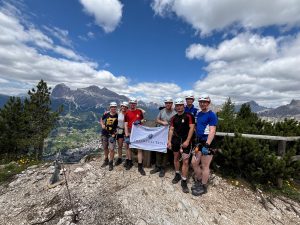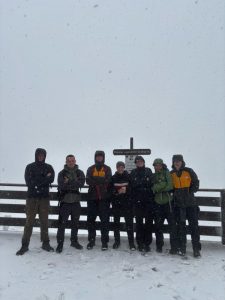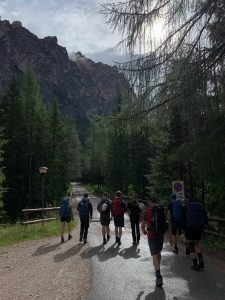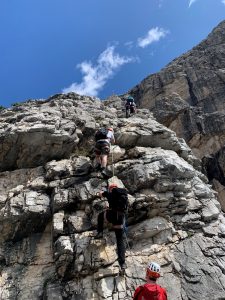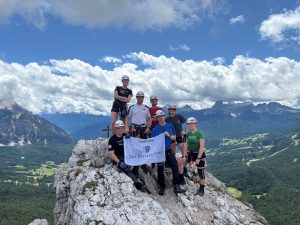Earlier this summer, seven officer cadets from the Manchester and Salford Universities Air Squadron took part in Exercise IRON ROAD – a week-long mountaineering expedition based in Cortina d’Ampezzo, Italy. With support from The Ulysses Trust, the team tackled some of the Dolomites’ most dramatic Via Ferrata routes, building resilience, leadership, and technical climbing skills in one of the world’s most spectacular mountainous environments.
Via Ferrata, Italian for “iron road,” involves climbing across steep alpine rock faces using fixed steel cables, ladders, and bridges. The expedition tested the cadets both physically and mentally, with each day presenting new technical challenges, greater exposure, and increased elevation. The aim was to develop confidence under pressure, personal discipline, and the ability to function as a team in an unfamiliar and often unforgiving environment.
Grit, Growth and Getting it Right: The group began with two moderate climbs to familiarise themselves with the unique demands of Via Ferrata, before progressing to more strenuous and exposed routes—including Michelli Strobel, Col dei Bois, and Sci Club 18, a highly technical final route rated 5C in difficulty.
Every route demanded focus, efficient kit admin, and peer support. One particularly challenging day saw the group hike 600 metres uphill – eschewing the available cable car – to access the Lagazuoi Tunnels, a First World War-era climb that ended in sudden snowfall. Despite the conditions, the cadets pushed through, demonstrating the resilience and adaptability that the expedition aimed to build.
“Climbing those routes really taught me the value of good personal admin and preparation,” said Officer Cadet Chambers. “Something as small as where you keep your water can make all the difference when you’re hanging off a cliff at 2,500 metres.”
Delivering Value Beyond the Climb: The team didn’t just grow as climbers—they developed as communicators and leaders. Each cadet was responsible for briefing the group, managing shared responsibilities like food and kit logistics, and supporting one another throughout the week. The importance of doing the basics well – packing efficiently, staying hydrated, and preparing for all weather – was a theme that ran through the entire exercise.
While the week was physically demanding, it also served as a powerful opportunity for mental reset. Several participants remarked that being in the mountains provided a rare moment of clarity and focus away from academic and training pressures. For some, it was also a chance to reflect on their future roles in the military and the importance of teamwork under duress.
A Word of Thanks: The expedition was made possible thanks in part to generous support from The Ulysses Trust, whose contribution helped cover key costs such as accommodation, transport, and activity support. This funding ensured the exercise remained accessible to all participants, regardless of financial background.
“The Trust’s support meant we could focus entirely on getting the most out of the experience,” said Sergeant Todd, one of the exercise leaders. “It gave us the chance to challenge ourselves in a way that simply wouldn’t be possible in the UK.”
Exercise IRON ROAD proved to be an unforgettable and transformative experience—one that will have a lasting impact on the cadets’ development as potential future leaders in the Armed Forces.

